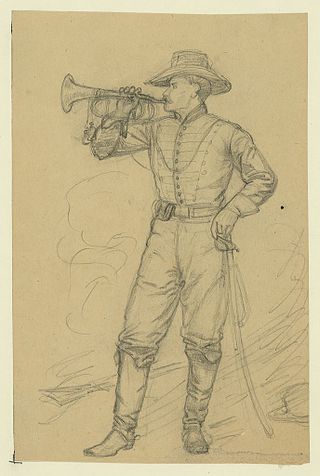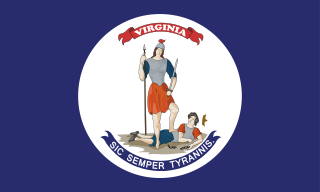Related Research Articles

The Grand Army of the Republic (GAR) was a fraternal organization composed of veterans of the Union Army, Union Navy, and the Marines who served in the American Civil War. It was founded in 1866 in Decatur, Illinois, and grew to include thousands of "posts" across the North and West. It was dissolved in 1956 at the death of its last member, Albert Woolson.

The First Battle of Bull Run, also called the Battle of First Manassas by Confederate forces, was the first major battle of the American Civil War. The battle was fought on July 21, 1861, in Prince William County, Virginia, just north of what is now the city of Manassas and about thirty miles west-southwest of Washington, D.C. The Union Army was slow in positioning themselves, allowing Confederate reinforcements time to arrive by rail. Each side had about 18,000 poorly trained and poorly led troops. The battle was a Confederate victory and was followed by a disorganized post-battle retreat of the Union forces.

During the American Civil War, the United States Army, the land force that fought to preserve the collective Union of the states, was often referred to as the Union army, the federal army, or the northern army. It proved essential to the restoration and preservation of the United States as a working, viable republic.

Ambrose Ransom "Rans" Wright was an American lawyer, politician, and Confederate general in the American Civil War.

The United States Sanitary Commission (USSC) was a private relief agency created by federal legislation on June 18, 1861, to support sick and wounded soldiers of the United States Army during the American Civil War. It operated across the North, raised an estimated $25 million in Civil War era revenue and in-kind contributions to support the cause, and enlisted thousands of volunteers. The president was Henry Whitney Bellows, and Frederick Law Olmsted acted as executive secretary. It was modeled on the British Sanitary Commission, set up during the Crimean War (1853–1856), and from the British parliamentary report published after the Indian Rebellion of 1857.

The U.S. state of West Virginia was formed out of western Virginia and added to the Union as a direct result of the American Civil War, in which it became the only modern state to have declared its independence from the Confederacy. In the summer of 1861, Union troops, which included a number of newly formed Western Virginia regiments, under General George McClellan drove off Confederate troops under General Robert E. Lee at the Battle of Philippi in Barbour County. This essentially freed Unionists in the northwestern counties of Virginia to form a functioning government of their own as a result of the Wheeling Convention. Before the admission of West Virginia as a state, the government in Wheeling formally claimed jurisdiction over all of Virginia, although from its creation it was firmly committed to the formation of a separate state.
The 4th Ohio Infantry Regiment was an infantry regiment in the Union Army during the American Civil War. It served in the Eastern Theater in a number of campaigns and battles, but perhaps is most noted for its actions in helping secure Cemetery Hill during the Battle of Gettysburg.

David Lang was a land surveyor, Confederate States Army officer during the American Civil War, civil engineer, and Florida politician.

William Ransom Johnson Pegram, known as "Willie" or "Willy", was an artillery officer in Robert E. Lee's Confederate Army of Northern Virginia during the American Civil War. He was mortally wounded in the Battle of Five Forks. He was the younger brother of Confederate General John Pegram, who was also killed in action. His grandfather, John Pegram, was a major general during the War of 1812.

During the American Civil War (1861–1865), Washington, D.C., the capital city of the United States, was the center of the Union war effort, which rapidly turned it from a small city into a major capital with full civic infrastructure and strong defenses.

African Americans, including former enslaved individuals, served in the American Civil War. The 186,097 black men who joined the Union Army included 7,122 officers and 178,975 enlisted soldiers. Approximately 20,000 black sailors served in the Union Navy and formed a large percentage of many ships' crews. Later in the war, many regiments were recruited and organized as the United States Colored Troops, which reinforced the Northern forces substantially during the conflict's last two years. Both Northern Free Negro and Southern runaway slaves joined the fight. Throughout the course of the war, black soldiers served in forty major battles and hundreds of more minor skirmishes; sixteen African Americans received the Medal of Honor.

James Parker Landis was an American soldier who served in the Union Army during the American Civil War. He received the Medal of Honor for the capture of a Confederate flag during the Battle of Amelia Springs while serving as the Chief Bugler of the 1st Pennsylvania Cavalry.

Charles Candy was a career soldier in the United States Army who served as an officer in the volunteer Union Army during the American Civil War. He commanded an Ohio regiment and, frequently, a brigade, during the war, and played a role in the defense of Culp's Hill during the July 1863 Battle of Gettysburg.

James R. Tanner was an American soldier and civil servant. He is best known for having lost both his legs below the knee at the Second Battle of Bull Run. Serving during the rest of the war as a government stenographer, he was present at the death of Abraham Lincoln and took notes that are the most comprehensive record of the events of the President's assassination. He later served as the United States Commissioner of Pensions, and helped reorganize and incorporate the American Red Cross.

James Winning McMillan was an American soldier who fought during the Mexican–American War and served as a Union Army general during the American Civil War.

George W. Harris was a United States soldier who fought with the Union Army during the American Civil War as a private with Company B of the 148th Pennsylvania Infantry, a regiment which "was present in every battle of the Army of the Potomac from Chancellorsville to the surrender at Appomattox and was in the hottest fighting of all of them except the Wilderness".

The 12th Virginia Infantry Regiment was an infantry regiment mostly raised in Petersburg, Virginia, for service in the Confederate States Army during the American Civil War, but with units from the cities of Norfolk and Richmond, and Greensville and Brunswick counties in southeastern Virginia. It fought mostly with the Army of Northern Virginia.
James Martin II was a native of Ireland who served in the U.S. Marine Corps during the mid-19th century. Rising up through the ranks from private to sergeant while fighting for the federal government of the United States (Union) during the American Civil War, he displayed conspicuous bravery on August 5, 1864, while serving aboard the USS Richmond. Operating one of that ship's guns under heavy enemy fire for two hours during the Battle of Mobile Bay, Alabama, he helped to damage the CSS Tennessee and destroy artillery batteries of the Confederate States Army at Fort Morgan, even as the enemy's shell and shot damaged his ship and killed several of his shipmates. In recognition of his gallantry, he was presented with the Medal of Honor, the United States' highest award for valor, on December 31, 1864.

Stevens Thompson Norvell was the son of U.S. Senator John Norvell of Michigan and his third wife, Isabella Hodgkiss Freeman Norvell. He was named after his father's friend and political ally, Stevens T. Mason. He was the grandson of Lt. Lipscomb Norvell, a Revolutionary War officer and an original member of the Society of the Cincinnati, buried in the Nashville City Cemetery, Nashville, Tennessee.

William H. Paul was an American soldier who fought with the Union Army during the American Civil War as a member of Company E of the 90th Pennsylvania Infantry and, later, the 11th Pennsylvania Infantry's E Company. He was awarded his nation's highest honor for valor in combat, the U.S. Medal of Honor, for saving and protecting the regimental flag of the 90th Pennsylvania Volunteers during the intense fighting of the Battle of Antietam in Maryland on September 17, 1862. That award was conferred on November 3, 1896.